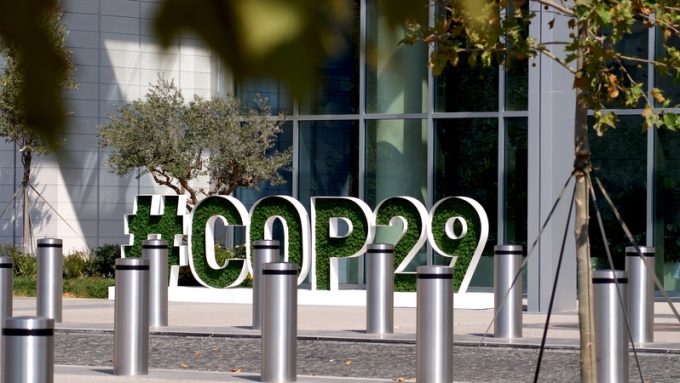Muddy waters at COP29 obscure climate consensus – progress elsewhere, though
That COP29’s week in Baku has turned into an embarrassment is impossible to ignore. Delegates may ...
WMT: RECORDWMT: SALES AND EARNINGS BEAT WMT: INTERIMS ON THE RADARBA: EXCRUCIATING PAINKNIN: CLOUD INFRASTRUCTURE SOLUTIONKNIN: CLOUD INFRASTRUCTURE APPEALODFL: GRI DISCLOSUREHD: INVENTORY RESERVATIONHD: PAYOUT CONFIRMEDFDX: YIELD AND LEADERSHIPDSV: ANOTHER BULL IN TOWNLOW: STEADY YIELDBA: JOB CUTS ON THE AGENDAMAERSK: LITTLE TWEAKDSV: UPGRADEF: HUGE FINELINE: NEW LOW
WMT: RECORDWMT: SALES AND EARNINGS BEAT WMT: INTERIMS ON THE RADARBA: EXCRUCIATING PAINKNIN: CLOUD INFRASTRUCTURE SOLUTIONKNIN: CLOUD INFRASTRUCTURE APPEALODFL: GRI DISCLOSUREHD: INVENTORY RESERVATIONHD: PAYOUT CONFIRMEDFDX: YIELD AND LEADERSHIPDSV: ANOTHER BULL IN TOWNLOW: STEADY YIELDBA: JOB CUTS ON THE AGENDAMAERSK: LITTLE TWEAKDSV: UPGRADEF: HUGE FINELINE: NEW LOW

After a week of slow progress, delegates at COP29 have been told to “cut the theatrics” and get on with the job of agreeing a trillion-dollar climate finance deal, with communiques urging action from the parallel G20 summit happening in Rio De Janeiro this week.
In Rio, António Guterres, UN secretary general, said he was “concerned about the state of the negotiations at COP29 in Baku.”
And his colleague, UN climate chief Simon Stiell, said ministers needed “to roll up their sleeves and dive into the hardest issues”.
Mr Stiell said that what he called “you first-ism” – the familiar zero-sum game of ‘climate chicken’ countries play with one another – “is a recipe for going literally nowhere”, and that “bluffing, brinksmanship and premeditated playbooks are burning up precious time… so let’s cut the theatrics and get down to the real business this week”.
The communiqué sent to COP29 from leaders at the G20 meeting reaffirmed the commitment to transition from fossil fuels, which Saudi Arabia, the world’s biggest oil exporter, has been trying to undermine over the past week.
While a group of island nations, parts of Latin America and developing countries sought to reaffirm the transition commitment made, against much resistance, during last year’s COP28 in Dubai, this was described as an an “erosion” of the “flexibility developing countries depend on” by the delegation from Saudi Arabia.
Indeed, such a commitment would run counter to the aims of Saudi Arabia’s oil demand sustainability programme (ODSP), overseen by crown prince Mohammed Bin Salman. The ODSP seeks to promote supersonic flight, tripling aircraft fuel consumption; foster a reliance on bunker-fuelled floating power plants in developing countries, replacing onshore renewable capacity-building; and efforts to partner with carmakers on extremely cheap personal combustion engine vehicles, in efforts to get the world’s poorest peoples to buy and use cars.
ODSP has been described as “repulsive” by climate thinktank Power Shift Africa director Mohamed Adow, who added that Saudi Arabia was “like a drug dealer… trying to get Africa hooked on its harmful product”.
Meanwhile, the communiqué was less clear on where the $1-1.5tn of climate financing should come from, which has been causing division within the halls of COP29. Some countries argue part should be raised from the private sector, but other parties, such as NGO 350.org, point out that private investment requires profitable returns, something at odds with the goals of the financing.
“This funding must come in the form of grants and public money, not private finance,” said Ilan Zugman, Latin America MD of 350.org. “Private finance in its very nature is about making profits, before meeting genuine human needs.”
The UAE has joined the UK and Brazil in committing to a climate action plan at this year’s COP29, entailing a CO2 emissions reduction of as much as 47% by 2035, compared with 2019 levels. But the plan relies heavily on carbon capture (CCS) technology, which has also come under fire this week.
Environmentalists are urging nations not to make their decarbonisation plans contingent on the operational success of CCS, an unproven, speculative, expensive technology with considerable flaws. CCS opponents argue that African and other developing countries have an opportunity to “leapfrog” developed countries by building out renewable energy rather than fossil-fired powerplants – but that money spent on CCS would instead ‘lock in’ future growth in, and reliance on, the use of fossil fuels.
And two representatives of the COP29 President Biden delegation, Congressman Frank Pallone and Senator Ed Markey, claim to have been harassed and physically threatened during their stay in Baku.
Mr Pallone told reporters on his return to the US: “You know this was orchestrated by the government. That’s what this was all about. In order to make a point that we don’t want you here and we don’t want you articulating concerns that you have.”
Comment on this article